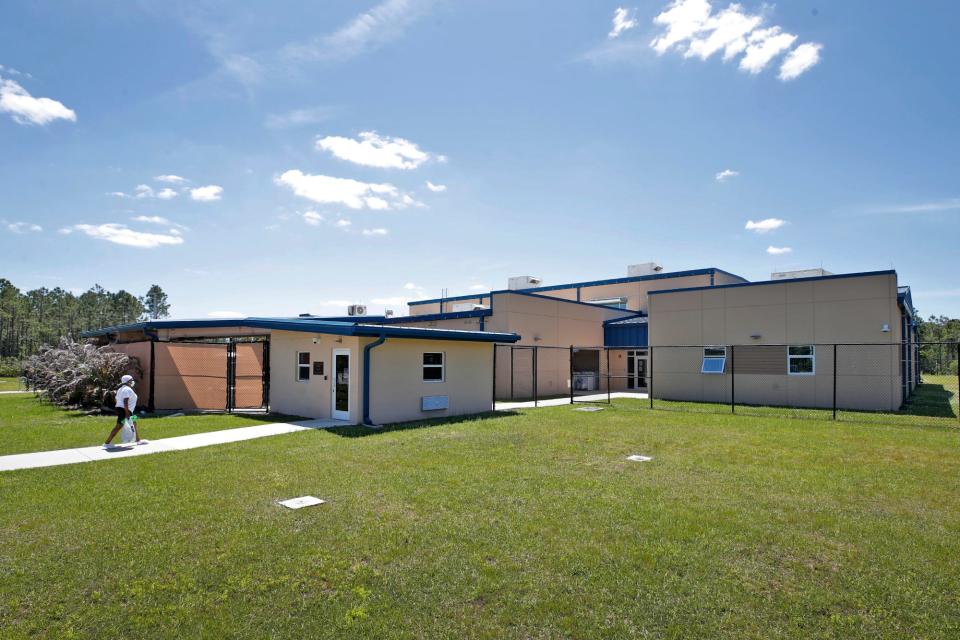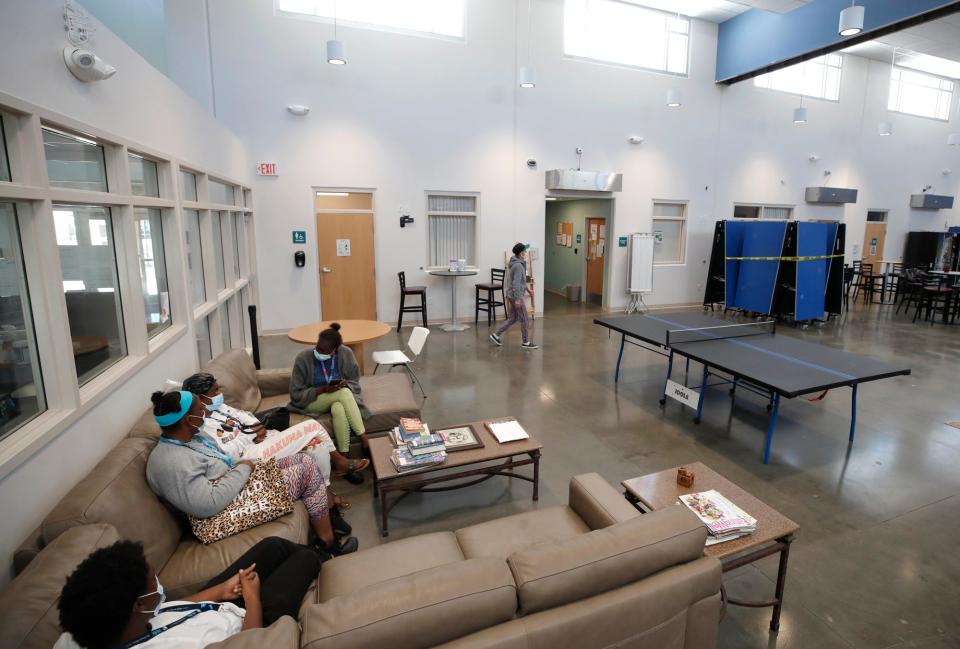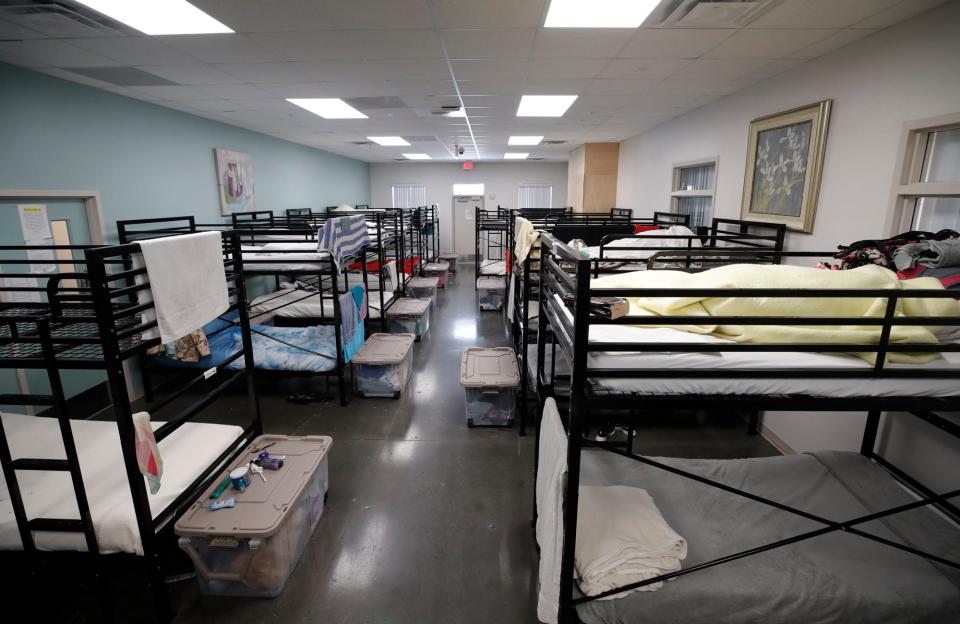Accomplishments celebrated at the once-troubled Daytona First Step homeless shelter
DAYTONA BEACH — Because of First Step Shelter, 544 homeless people escaped the streets and got a permanent roof over their heads.
More than 1,000 unsheltered people stayed at a place where they were given free meals every day, a bed of their own to sleep in each night, and help with everything from getting a job to connecting to vital medical care.
Some 3,300 people found a secure place to sleep with restrooms and free food in the shelter's outdoor safe zone.
First Step Shelter Executive Director Victoria Fahlberg shared those achievements during Wednesday night's Daytona Beach City Commission meeting as she delivered the shelter's annual report.

They were accomplishments more than a few local residents thought they would never see during the decade-long fight to open a homeless shelter in Daytona Beach, and amid the turmoil shortly after First Step opened when the nonprofit running the facility decided it didn't want to be involved any longer.
Nearly four years after the shelter on Daytona Beach's western edge welcomed its first homeless client, Fahlberg was able to run down a list of the city-owned facility's milestones and improvements.
"Thank you for everything you do," City Commissioner Monica Paris told Fahlberg.
"You've come a long way," said City Commissioner Ken Strickland, who volunteers at the shelter twice per week.
Daytona homeless shelter hitting key goals
When the shelter first opened on Dec. 16, 2019, the one-story facility five miles west of Interstate 95 was set up to handle 40 clients at a time. Now it's ready to house a maximum of 100 people on any given day, and has been since June.
Reaching that point already has impressed Mayor Derrick Henry, who also serves as chairman of the First Step Shelter Board.
"To go from 40 to 100, I never thought we'd be able to say that at this time," Henry said.

So far there haven't been enough homeless people wanting to fill 100 beds at the shelter. The headcount has settled at around 60-70 people per day, Fahlberg said.
But the mayor is still happy First Step has reached a point where it can help that many people simultaneously. It helps justify the $400,000 the city gives to the shelter for its operations each year, he said.
"This is our way of saying, 'this is where your money is going,' " Henry said.
The mayor and others are also happy with the money raised at the shelter's first fundraiser. The February gala grossed $273,503 and netted $236,400 after expenses.
The shelter now has a $1.59 million annual budget.
"It's working," Henry said of the shelter.
Homeless arrive at shelter with major challenges
Fahlberg had more good news to share. She mentioned the new and sturdier bunk beds in the men's dormitory that were donated by shelter board member Mike Panaggio.
The shelter also received a $984,000 federal grant through the 2020 Coronavirus Aid, Relief and Economic Security Act that has gone toward several improvements.
First Step now has a room divider in the main activity and dining room that can create a space for 20 homeless people to stay during tropical storms and hurricanes. First Step also has a new walled-off space to quarantine sick people when needed or to serve as a meeting space.
The shelter was also able to buy a large generator and add a canopy over outdoor picnic tables.

The nicer surroundings are welcome in a place where people walk in with heavy burdens on their shoulders.
About 90% have psychiatric or medical conditions, and sometimes both. The health conditions are often serious, and include things such as PTSD, schizophrenia, depression, bipolar disorder, cancer, chronic heart conditions, HIV, asthma and seizure disorders.
Fahlberg said shelter employees have to call for ambulances at least twice a month because a resident is having a seizure.
Around 85% have drug or alcohol addictions.
Caseworkers connect people with needed medical care, and there are four Alcoholics Anonymous meetings each week at the shelter
Caseworkers also help residents get copies of their birth certificates and sign them up for Social Security benefits, Medicare, Medicaid and food stamps. They also help with everything from computer training to transportation.
More homeless-related news: Daytona Beach fights to get law against aggressive panhandling reinstated
Many shelter residents are older, with the shelter population's average age at around 50. That's been especially true lately.
"We're getting more and more people who lived in the same place for a long time, including elderly people, but their rent has gone up," Fahlberg said. "Their rent has gone from like $800 per month to $1,600, and they're losing their housing."
You can reach Eileen at Eileen.Zaffiro@news-jrnl.com
This article originally appeared on The Daytona Beach News-Journal: Daytona Beach's homeless shelter can now handle up to 100 residents.

